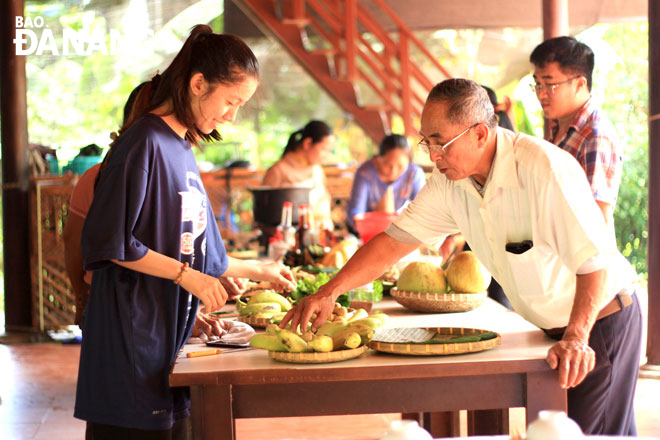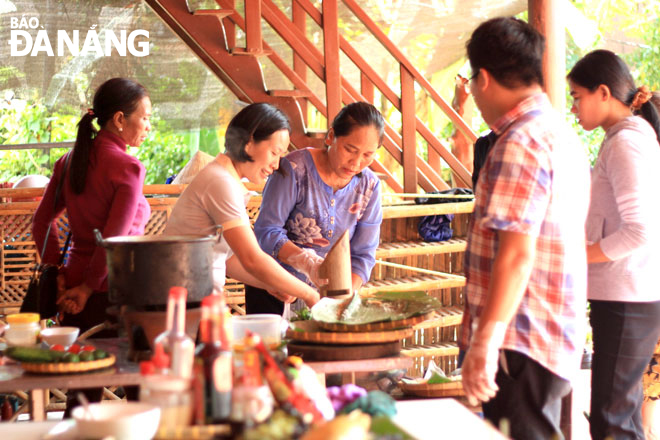Da Nang people develop tourism for sake of forest protection
“After several years of experience, I realise a fact that doing sustainable community-based tourism means the protection and restoration of primary forests. Thanks to participating in community-based tourism, we understand the value of the forest, so we join hands and wish to preserve the old forest…”, said Ms. Tran Thi Phuong, Gian Bi village, Hoa Bac Commune, Hoa Vang District, Da Nang. She is a member of Hoa Bac Community Ecological Agriculture and Tourism Cooperative whose head of this cooperative is also a women with a strong passion for preserving the forest.
 |
| Members of Hoa Bac Ecological Agriculture and Community Tourism Cooperative participate in a cooking training class to serve community-based tourism. |
Fall in love with community-based tourism
Ms Do Thi Huyen Tram is Chairman of the Board of Directors, Director of Hoa Bac Ecological Agriculture and Community Tourism Cooperative, the owner of Nam Yen homestay in Hoa Bac Commune. Tram used to be a Hoa Bac Commune’s public servant, with a stable salary and a side job selling agricultural products sourced from the countryside for sale to the city-dwellers.
In 2021, Tram stopped working in the commune administration and devoted herself to doing community-based tourism. A new journey that is arduous and equally thorny for someone who has just reached the age of forty.
“Previously working in the commune, I approached and followed projects to support sustainable development for the Co Tu ethnic minority area of Hoa Bac Commune. My family also owns a homestay. The concept of tourism has been shaped and gradually absorbed over those years. But I didn't really think about quitting my job in the commune until I met teacher Trinh," Tram said.
“Teacher Trinh”, who is Ph.D Chu Manh Trinh, a conservation expert of Cu Lao Cham (Cham Island) Marine Protected Area, Hoi An, Quang Nam Province. ‘Teacher Trinh’ is a name affectionately known by farmers working in community-based tourism in the Quang Nam, Quang Ngai, and Da Nang. He is also well known by other names, such as ‘Ph.D of Stone Crab’, ‘Ph.D of Community’. These titles come from his work in conservation of the Cu Lao Cham Marine Protected Area, his teachings on how to do community-based tourism in the above-mentioned regions, and are trusted and cherished by the people.
During his meeting with Tram, teacher Trinh pointed out the true value of Hoa Bac forests and the harmful effects of losing them. “If we do not protect, preserve and restore forests, Hoa Bac will no longer have any value. Cultural values and people's lives will therefore also disappear and be diluted by the massive import of cultural flows from outside. Keeping forests by doing sustainable community-based, green tourism.”, Tram said.
Starting a business
After many nights of pondering, Tram decided to do community-based tourism. Even though you identify the specific goal, how to achieve it is not child’s play. “Initially, I opened a tutorial class, attracting mainly young people to mobilize like-minded people. But then, none of the young people could stand firm because of the long-term strategic nature of the project. I paid attention to middle-aged people again. Being patient, dedicated and hard-working, I gradually convinced them to follow the same path.”, Tram said.
In the first two years, community-based tourism activities in Hoa Bac were mainly spontaneous on the basis of connecting the supply chain of community-based tourism households in the beginning. Through welcoming visitors, the community-based tourism and eco-tourism classes have accumulated experience, clearly shaped a relatively complete picture of community-based tourism for Tram and others in Hoa Bac. Bright, green patches gradually appear….
In March 2023, Hoa Bac Community Ecological Agriculture and Tourism Cooperative was established with 19 members forming a supply chain boost connection and promote community capacity. The goals of the cooperative are determined very specifically, including preserving the culture of the people; developing organic agriculture; keeping forests sustainable and developing livelihoods for the community. According to Tram, of all these aforementioned goals, the final goal is still sustainable forestry. Only with the forest can we have everything, and only then will we have the conditions to realise the remaining goals.
“In the classes, we experience afforestation from participating in selecting native tree varieties to nurturing and planting trees to create forests. The people themselves participate in practicing with tourists so that both sides can learn from each other and share positive knowledge. People can both work in their own forests and earn income through providing experiential tourism product for tourists. Similarly, other cultural experience activities from knitting, brocade weaving, pottery making, traditional music of the Co Tu people are all like that. Each class is individually designed to suit the conditions, subjects and needs of tourists based on the available supply chain of community resources.”, said Tram.
 |
| Members of Hoa Bac Ecological Agriculture and Community Tourism Cooperative participate in a cooking training class to serve community-based tourism. Photo: PV |
Relive the cultural space of the nation
We are very happy as we are able to created community-based tourism products, earn more income, and especially return to nature in the true sense, relive the cultural spaces of my nation that seemed to have been on hiatus for many years. It is known that doing tourism activities to serve tourists. Actually, we practice our nation's lifestyle, do cultural activities and admire the nature according to our own way of life from the past. The only difference is being responsible and proactive in protecting nature, preserving and promoting cultural values, cultural spaces, and promoting traditional crafts. All are in the direction of green life and sustainable tourism.”, said Ms. Phuong.
Community tourism, in Ms. Phuong's opinion, is to build a clean, environmentally- friendly house, from a model garden planted with native fruit trees and pesticides refined from herbs. The house is clean and tidy, from the bedroom, kitchen, and household items, all of which are in an environmentally-friendly way. Waste is seriously classified. Plastic bags are very limited in use. Fallen flowers and leaves are composted to make organic fertilizer.
Do Thi Huyen Tram said that after many days of effort, cooperative members, and many community tourism workers in Hoa Bac as a whole have changed their thinking, awareness and increasingly improved their skills in doing community-based tourism. Another joy is that organisations and individuals both at home and abroad, with many experts, including professors and scientists specialising in community-based tourism development, are ready to support Hoa Bac residents to create good-quality community-based tourism products and services. Meanwhile, many localities have sent delegations to study Hoa Bac's model with positive signals.
The hope seed has sprouted on Hoa Bac land, and people doing community-based tourism along the Cu De river basin in general. With clear goals, scientific and effective methods, awareness and thinking of people doing community tourism have changed positively in a green and sustainable direction. Hopefully, in the future, the primeval forests upstream of the Cu De River will become green again. The water of the Cu De River will become fresh and the rich culture of the indigenous people here will be promoted.
Reporting by TRONG HUY - Translating by A. THU







